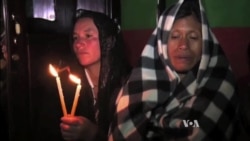Every day, hundreds of undocumented immigrants from Central America attempt the arduous journey through Mexico and turn themselves over to U.S. border patrol - with the hope that they will not be turned away. But the dangers they face along the way are many, and their fate rests on more than just the reception they get at the US border.
“On June 15th, we received a call that the body was found in the area of Patricia Perez in Nopal street in La Joya ... somewhere in the brush area,” said Jose Rodriguez, a law enforcement officer with the Hidalgo County Sheriff's office.
Jose Castellano, who found the Guatemalan boy's body, said, “We saw the horse jumping and everything, and kicking. I told my brother, why the horse is kicking and everything, and he said ‘I don’t know.’ So the first thing we do, we just got to the horse and then we saw the body...”
All too common
Castellano described seeing the body of Gilberto Ramos Juárez - an 11-year old undocumented immigrant from Guatemala - partially decomposed in the Texas summer heat.
Gilberto's story is a common one - of migrants trying to escape the hardships of their countries to build a more stable future in the United States. He had hoped to find work so he could give his mother back home a better life.
Taking weeks, even months, the trek across the vast Mexican countryside and into the United States is extremely dangerous, and comes with high risk.
For those trying to reach the border towns in “el norte” - the North, as it is often called - extreme weather is only one hazard they are likely to encounter.
It's common for the so-called “coyotes" - criminals who engage in human smuggling - to sexually assault, rob, or kidnap their clients - or force them to smuggle drugs for the Mexican cartels.
'Evil, wicked'
Carl Henderson, a former Border Patrol agent, said, “Some of them think they’re hiring a smuggler only to find out that they’re now being trafficked into sexual slavery or into work slavery on these marijuana farms for some of the drug cartels. These people that are smuggling you are some of the most evil, wicked people in Mexico, and probably in the world today. These are people who decapitate, maim and murder people by the thousands.”
Despite these dangers, the number of undocumented children and families crossing into the United States is on the rise. One federal agency (U.S. Executive Office for Immigration Review) has reported a backlog of more than 375,000 individual cases in 2014. Most of those are from Guatemala, Honduras and El Salvador - countries where gang and drug violence is on the rise. These issues, combined with a U.S. law designed to protect children at risk of sex trafficking, have contributed to the large influx.
One of the most popular entry points, and closest geographically to Central America, is in the Rio Grande Valley, where the number of migrant crossings in 2014 has tripled since 2010.
Violent crime
Many of them come out of fear.
Eddy, a Guatemalan immigrant, said, “Crime, drug trafficking, stolen children... you are always in fear that they [the "coyotes"] will enter and take your kids right out of school without any problems because of the lack of security. This is a fear we have every day.”
Alma, a Honduran immigrant, said, “I think that with less crime and more work, there wouldn’t be a need to move. We don’t move as much for economic reasons as much as crime, because even if the criminals don’t attack me, they will harm my family.”
For those who do make it across the desert, their fate may depend on whether Congress and the president can agree on how to handle the situation. Ultimately, they could be deported, so the dangerous journey could have been for nothing.





